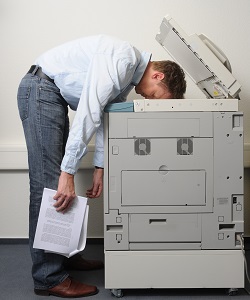
How to Turn Stress into Productivity
We all know that stress is bad for us, right?
Maybe not.
Now both researchers and management experts are recognizing that some stress can actually be good for us too.
That’s right; some stress can lead to enhanced performance, improved productivity and allow us to complete tasks and projects that we thought were impossible.
So what can we do to manage stress and turn it into productivity?
High Levels of Stress
But first of all, the bad news. All of us are collectively feeling more stressed out at work these days.
A recent survey by the Nielsen Company, a polling company in the United States, found that 80 percent of all American workers reported high levels of stress at work.
Some of this was directly related to the current downturn in the economy and the need for companies to do more with less. But some of it also reflected the tightrope that many workers are walking as they try to balance the demands on them from both work and family responsibilities.
This increased stress is certainly not all good, and the impact is being felt throughout the workplace as more employees burn out or suffer from one of the many health-related issues and illnesses that can be caused by too much stress.
This includes an increased chance of heart disease and strokes, anxiety, clinical depression and other mental illness. There is a direct and obvious cost of high stress to both employees’ health and the business’ bottom line.
Some Stress = Productivity
The good news is that at least some of this stress might actually be driving improved production and productivity at some of these same corporations where staff are reporting being stressed out.
Scientists have long known that human beings have a capacity for peak performance, and if they can be taught or trained to hit that high point, they can do unbelievable things. They also have learned that if they go over that line, like an athlete who trains too hard, they lose effectiveness and may even suffer severe consequences.
More than one hundred years ago two psychologists, Robert Yerkes and John Dodson codified these ideas into a law that was named after them. The Yerkes-Dodson law can actually be drawn out on a graph that predicts the peak performance in any scenario.
Now researchers are trying to translate that law into behaviour patterns for not only elite athletes to use but also to help the rest of us perform at our best at work. The basis for those behavior patterns is so we harness our anxiety and stress to go along with our best efforts to achieve that peak performance.
Finding the Right Mix
In practice that means we have to try to find the right combination to achieve that effect. For most of us, it will be a trial and error process. We will need to test ourselves to find out how much pressure keeps us motivated and what the key tipping points are, where once we pass them, we begin to lose steam.
It will also need regular monitoring and updating as new events and new challenges emerge. But over time we will begin to see what helps us get to our peak performance and how we can stay there as long as possible.
But just as important as knowing what helps us is to recognize what hinders us or holds us back. For many of us that means we have to look at getting rid of or reducing the unnecessary and harmful stress that can easily build up, both at home and at work.
Managing and Lowering Stress
At home we need to make sure that we have a relaxing and comfortable environment to return to at the end of the day. This is important so that we cannot just unwind, but recharge our batteries that are likely going to be exhausted as we reach for our peak at work.
Achieving that peak performance also means that we have to take care of our bodies when we are not at work. Like professional athletes, we need regular training to keep our bodies and minds in top shape.
That will allow us to better manage the stressors that sap our energy at work and more easily convert the pressure into fuel that we can harness for production later. It also includes the basics of bad stress reduction: eating properly, not overindulging in alcohol, and finding some form of healthy relaxation other than watching television.
If we can do all of these things on a regular basis we can not only live with the stress and pressure of work, we can actually start to enjoy it more. Making stress work for you will take a little effort, but in the long run both you and your boss will be happier that you did.